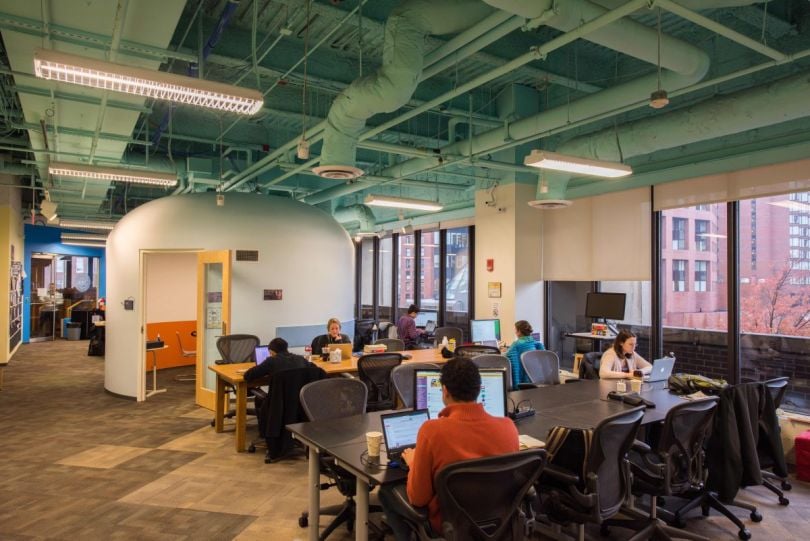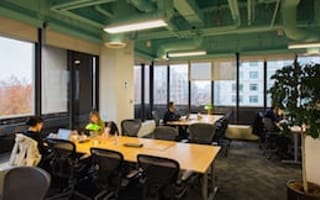
At first glance, the Venture Café located on the fifth floor of the Cambridge Innovation Center (CIC) seems like any other coffee shop.
Rustic wooden tables creak as visitors unpack laptops from backpacks, and fancy brewing machines gurgle as they prepare hot coffee and espresso.
But the Venture Café is no ordinary coffee shop — it’s home to local entrepreneurs, investors, and enterprises striving to catalyze innovation and foster entrepreneurship in the Greater Boston area at breakneck speed.
Founded in 2010, what started as a social experiment where like-minded innovators could meet weekly has grown into a global network of sites dedicated to forging relationships within innovation communities. The Venture Café at Kendall Square has become a place for entrepreneurs to network, launch startups, find team members, hold demos and workshops and ultimately, to get work done.
GeoOrbital, for example, a startup making electric wheels for bicycles, assembled its founding team at a Venture Café event, while startups like Pixability and January and accelerators like Betaspring have launched out of the 1 Broadway space.

Even though the CIC is now home to over 650 companies in Cambridge alone, from two-person startups to 70-person teams, the popular coworking space wasn’t always this successful.
In fact, what CIC founder Tim Rowe launched back in 1999 was a total flop, said Alex Cheung (pictured below), C3 Community Leader at the CIC. 
Rowe and his wife, both alumni of the MIT Sloan School of Management, initially tried to start a traditional incubator. They had many friends in the startup space and noticed that it was hard for these small enterprises to find investors and affordable places to work.
“It tanked within two years,” Cheung said. “The whole model of being an incubator and making decisions about what to invest in just didn’t work.”
But they didn’t give up. They salvaged their concept of a shared office space and decided they were going to do communal coworking “right” — the “Four Seasons of shared offices,” if you will.
To them, this meant making sure any companies working in their space would have all amenities available to them for free, including phone booths, conference rooms, bathrooms, fully-stocked kitchens and a support team of 70 that are on call to help members with whatever they need.
“Just bring a laptop and we supply everything else,” Cheung said. “We remove things companies wouldn’t want to think about, like printing problems, so they can focus on what’s important — growing their business.”
To support this, CIC focuses heavily on hosting community events. There are about a dozen held weekly at the Venture Café alone, and they range from meetups about how to pitch to investors, to lunches for women in STEM and community acupuncture sessions.

The CIC has grown rapidly in the past few years. In 2016, it launched coworking spaces in Miami and Rotterdam, and is currently in the process of adding more floors to its Boston location.
While scaling, Cheung said it’s important for the company to maintain its status as more than just a coworking space.
“We’re very focused on the way we’re growing,” Cheung said. “We’re not just a shared office space, we’re building an ecosystem.”
And having the Cambridge location as the CIC’s headquarters has been critical to the company’s success, Cheung added.
“We’re near money, ideas and talent,” Cheung said. “We’re right next to Harvard and MIT, so we have top talent here and we want to keep it here. We also have a lot of investors in the area and people come to this area all the time for research and events.”

The CIC has also grown a nonprofit arm called the Venture Café Foundation, which focuses on community entrepreneurship and economic development. This branch hosts "Venture Café Thursdays" at Kendall Square, where many entrepreneurs network and share ideas.
The Foundation operates the Roxbury Innovation Center (RIC) located in the heart of Roxbury as a mission-driven event space for groups to provide programming that supports innovators, entrepreneurs and business founders.
“This is all about bringing entrepreneurship and ideas to areas usually underserved and underdeveloped,” Cheung said. “We want to bring positive energy to lower-income, minority populations, and this is all a part of our innovation campus. We have all the resources to bring together these communities and bridge those gaps.”
What really makes the CIC special, Cheung said, is the rich community.
“There are genuine connections here,” he said. “What we foster is not just between the staff and the clients, but we connect clients to each other, and that’s one of the most exciting things for me.”

SQZ Biotech, for example, started as a few MIT researchers working out of the CIC to develop a more effective way to get materials inside cells — a significant challenge in many research and therapeutic applications. MIT Professors Klavs Jensen and Robert Langer and their graduate student Armon Sharei thought that by squeezing a cell, serious illnesses could be treated more efficiently.
When other CIC members saw the team building their revolutionary cell-squeezing prototypes, they encouraged the researchers to enter MassChallenge, a global startup accelerator and competition.
So in 2014, the newly-formed SQZ Biotech team entered MassChallenge and beat out more than 1,600 early-stage entrepreneurs from all over the world to win the highest MassChallenge prize of $100,000 and a prize of more than $200,000 from Boeing — all because of a suggestion from a fellow CIC member.
“If you were just at a small place to work, you wouldn’t have that,” Cheung said. “That’s why we’re making sure we grow and not only have small companies use us, but also big ones.”
Photos via company
Know a company worth profiling? Let us know or tweet us @BuiltInBOS




